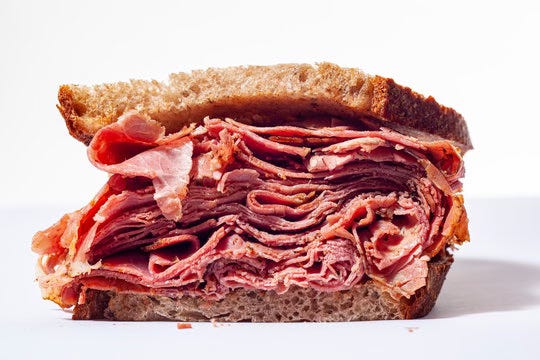Make Sure Your Characters Want Something—Even If It’s Just a Pastrami on Rye
Writing Tip from the Hardboiled Streets of Fiction Town
Here’s a slice of writing advice so simple it might’ve been scrawled on a diner napkin in ketchup: “Make sure your characters want something. Even if it’s just a sandwich.”
Sounds ridiculous, right? But listen, ridiculous is where the good stuff lives. Because want—raw, human, stomach-growling want—is the greasy gear that turns the story machine. Characters without desire are mannequins in a trench coat. Creepy? Sure. Interesting? Not unless you're filming a horror short in an abandoned Macy’s.
Hunger Drives the Plot—Literally and Figuratively
Every good story starts with a character who wants something. Could be revenge. Could be true love. Could be the last meatball sub on the planet. Doesn’t matter. That want—that ache in the soul or belly—is what gets the plot out of bed and into traffic.
Take Die Hard. John McClane just wants to patch things up with his wife. Boom—terrorists. In Finding Nemo, Marlin wants to find his boy. Splash—adventure. In your noir-drenched detective yarn? Maybe your gumshoe just wants one night without someone trying to shoot him. Sorry, pal.
A story without want is like a car with no gas. Looks great in the driveway. Goes nowhere.
The Sandwich Principle
Let’s not dismiss the sandwich. That humble hoagie is a storytelling miracle.
If your protagonist is hungry, they’re compromised. They’re irritable, distracted, maybe willing to bash a vending machine with a crowbar. Suddenly you’ve got action. Stakes. Consequences. Hunger turns “man walks into a room” into “man walks into a room and punches a guy because he ate the last turkey club.”
A character who wants something—even a sandwich—is a character who does. And characters who do things are the ones we follow.
Want vs. Need: The Existential Deli Counter
Every seasoned writer knows the classic tango: want vs. need. Your character might want to win back their ex. What they need is to develop a personality. They might want to burn down the system. What they need is therapy.
But nobody gets to the big realization without chasing the wrong thing first. The want gets them out the door, the need smacks them upside the head at the end of act two.
Don't skip the want. Even if it’s petty. Even if it's deli meat. The want moves the feet.
Conflict Is Just Competing Cravings
You want conflict? Put two people in a room and give them one sandwich.
Conflict doesn’t need grand evil plans or doomsday clocks. It needs people who want different things at the same time. That’s it. Sibling vs. sibling. Lover vs. lover. Developer vs. tree hugger. You name it.
Internal conflict? That’s just one person wanting two things at once—freedom and security, justice and mercy, a clean conscience and revenge with a side of fries.
If your characters don’t want anything, they’ve got nothing to fight for. And that means your reader’s got nothing to care about.
Even the Extras Are Starving
Want gives depth. Show me a villain who wants to take over the world, and I’ll show you a cliché. Show me a villain who wants to take over the world because he never got that promotion at EvilCorp, and now we’re cooking with gas.
Even your side characters—the ones with two lines and a bad haircut—should want something. Maybe it’s to clock out on time. Maybe it’s to impress the boss. Maybe it’s to survive the night shift without wetting themselves.
These little wants breathe life into your world. They make it messy, weird, real.
The Scene Doctor's Quick Fix
Here’s your go-to writing stethoscope: When a scene feels flat, ask, “What does this character want right now?”
Not in the abstract. Not someday. Now. In this moment.
Do they want to leave the room? Shut someone up? Hide the evidence? Prove they’re smarter than the jerk in the tie?
Give them a want and an obstacle to that want and suddenly that dialogue crackles. That action matters. That scene lives.
Final Thought, Hold the Mayo
Story is want, plain and simple. Your character’s got to crave something. Glory. Love. Redemption. Pastrami. Doesn’t matter. No want? No story. Just a bunch of words loitering on the page, looking guilty.
So when your scene stalls, your plot limps, or your dialogue sounds like it was written by a sleepy chatbot?
Remember the sandwich.
Even a guy who just wants lunch is more interesting than a guy who wants nothing. Because the guy who wants lunch might start a fight. Might steal. Might lie. Might get killed trying.
And now you've got a story.
###
Like this? Share it with a reader or writer who appreciates a good moral gray zone—and subscribe for more deep dives into character, storytelling, and the strange, shadowy world between heroes and monsters.
Tony Sarrecchia


